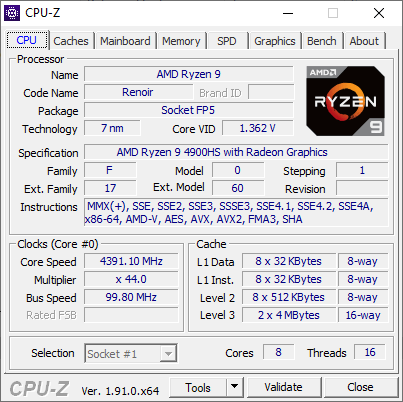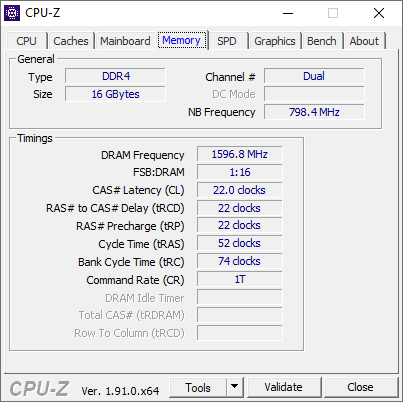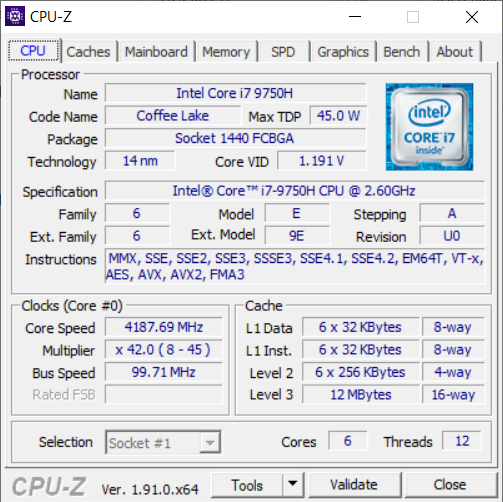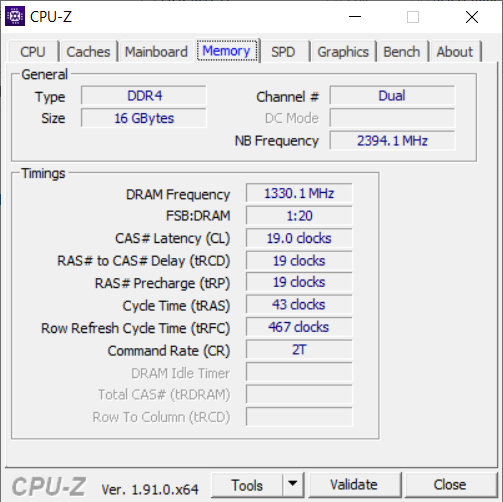AMD’s Mobile Revival: Redefining the Notebook Business with the Ryzen 9 4900HS (A Review)
by Dr. Ian Cutress on April 9, 2020 9:00 AM ESTCPU Benchmarks
Comparison of these two CPUs is going to be interesting. Both laptops being tested excel in different ways:
| ASUS Zephyrus G14 vs Razer Blade 15 | ||
| ASUS Zephyrus G14 |
AnandTech | Razer Blade 15-inch |
| Ryzen 9 4900HS | CPU | Core i7-9750H |
| 8 / 16 | Cores / Threads | 6 / 12 |
| 1400 MHz | Idle Frequency | 1100 MHz |
| 3000 MHz | Base Frequency | 2600 MHz |
| 4300 MHz | Rated 1T Turbo | 4500 MHz |
| 4500 MHz | Measured 1T Turbo | 4200 MHz |
| 35 W | TDP Listed | 45 W |
| - | TDP Measured | 35 W |
| - | PL2 Listed | 60 W |
| - | PL2 Measured | 45 W |
| 16 GB DDR4-3200 22-22-22 1T |
DRAM | 16 GB DDR4-2666 19-19-19 2T |
The ASUS device has more cores, and by the looks of our testing, actually turbos to a higher frequency, regardless of the sticker on the box. We’ve already shown that AMD’s Zen 2 can have comparable if not better IPC than Intel’s Coffee Lake refresh, so add that to the more cores, should put every test in AMD’s camp.
What should benefit Intel here is the on-box TDP, of 45 W, compared to the AMD 35 W. When we fired up our usual program for monitoring Intel frequencies, it showed that there is a hard coded BIOS boost up to 60 W, which we thought should give some extra power. However, when the system was actually set to a workload, the peak turbo power was only 45 W, which the system was able to keep for 10-15 seconds. Then it sat back at 35 W, which makes it in line with AMD. This is odd performance from the Intel CPU, however we assume at this level that Razer has made the decisions in order to fit within the thermal profile of the Blade 15 chassis.
If Intel has a lower frequency, fewer cores, and a lower frequency, all for the same power envelope as AMD, then it looks like a slam dunk for AMD.








It is. These systems are built with productivity in mind, and even with benchmarks that are bursty like PCMark, AMD takes the win.

I also took some time to run the Civ 6 AI benchmarks, which performs 10 turns of a late game and averages the turn time. Intel won this test, but I performed it again with the power unplugged and on battery saver mode in Windows. The results were reversed:

This led me to do some more tests without power connected. I’ve separated these out into a different page, combining some CPU and some GPU data.














267 Comments
View All Comments
Curiousland - Sunday, April 12, 2020 - link
US is adding more restrictions on TSMC to ship chips to Hwawei which is one of the biggest 7nm and 5nm customers of TSMC. So like it or not TSMC will have a lot more capacity and to rely on AMD's business. So, yeah, TSMC and AMD will work more closely ever before.https://www.cnbc.com/2020/03/27/us-prepares-crackd...
Namisecond - Tuesday, April 14, 2020 - link
Like your article link says, that's more likely to hurt TSMC and it's western customers like AMD, Nvidia and Apple more than it will Huawei. At this point, I don't think it's going to happen. Even if it does, it won't affect contracts already in place and products already in production. Remember, 18 month lead time.JayNor - Sunday, April 12, 2020 - link
this is partially an Intel product, and they thank you." a 1 TB Intel 660p NVMe SSD, and an Intel Wi-Fi 6 solution."
dguy6789 - Tuesday, April 14, 2020 - link
What do you mean? Intel's 9900K is faster than anything AMD has in gaming including AMD's 4 grand CPU. And that is just 14nm vs 7nm.AMD won't have a better gaming CPU than the 9900K 2 years from now.
Qasar - Tuesday, April 14, 2020 - link
and the 9900k only has the performance lead for one reason, clock speed, which is the only reason intel has any performance lead right now, while using more power to get that performance. clock the cpus at the same speed, and see what happens.schujj07 - Tuesday, April 14, 2020 - link
Outside of gaming, the 3700X performs as good or better than the 9900k more often than not, all while the 9900k draws a massive 60% more power. In gaming benchmarks the 9900k is ahead by about 5% at 1080p using a 2080Ti. At that point it is the difference between 300fps & 315fps. No way that you or I will ever be able to tell the difference.schujj07 - Tuesday, April 14, 2020 - link
Edit: The 9900k has a 3.6GHz base and 5GHz boost clock. 3700X has 3.6GHz base and 4.4GHz boost. Even with a 13.5% higher boost clock, see typically in single threaded applications, the 9900k is only barely able to beat out the 3700X in some single threaded applications. Difference is usually 3% on average. Normalized for clock speed Zen 2 has about an 8% IPC advantage over Sky Lake and its derivatives.marrakech - Sunday, November 8, 2020 - link
https://www.dell.com/en-nz/work/shop/workstations/...https://www.cpubenchmark.net/compare/Intel-Xeon-W-...
marrakech - Sunday, November 8, 2020 - link
nice prediction ,just as an information i seen some dude soend 6000 $ for an intel xeon w workstation the best 8 core mobile intel and its still slower then my 4800H cpu
total cost of laptop after ram upgrade 1180$
jgood13 - Monday, February 22, 2021 - link
I don't think this is going to prove to be true...